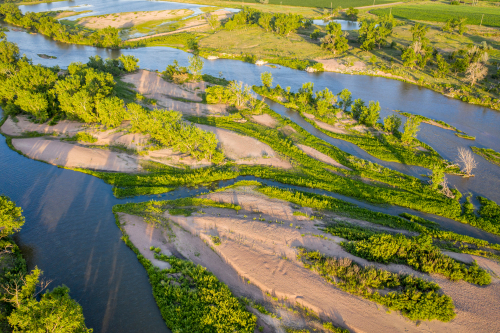LINCOLN – In his letter to residents of the state this week, Governor Pete Ricketts made the case for preserving water resources.
“Nebraskans know every drop of water is precious. Agriculture is our top industry. It makes up 20% of our economy, and it generates one in four jobs in our state. Access to water makes this possible. We have the most irrigated acres of cropland in the country. Three of eight acres of farmland in Nebraska are irrigated.
Fifty years ago, far-sighted Nebraskans set up a system of water management, including our Natural Resources Districts (NRDs), that has allowed us to manage our water based on river basin. This has allowed our state to maintain the Ogallala Aquifer within one foot of where it was in the 1950s.
By contrast, Colorado has mined their water. The Ogallala Aquifer under Colorado has dropped nearly 15 feet since the 1950s. Now, Colorado is aggressively planning new developments that threaten Nebraska’s water resources. Last year, Colorado released their South Platte Basin Implementation Plan. It was updated last month and now includes 282 total projects to meet their growing demands. Altogether, these projects cost an estimated $9.8 billion.
Thankfully, 100 years ago Nebraskans negotiated an agreement with Colorado over the use of South Platte River water. The South Platte River Compact (Compact) was signed by Nebraska and Colorado in 1923 and ratified by Congress in 1926. It entitles Nebraska to 120 cubic feet per second (cfs) of water from April 1st through October 15th (irrigation season) and 500 cfs of water from October 16th through March 31st (non-irrigation season). Under the Compact, we can only claim our non-irrigation season water entitlement by building a canal and reservoir system—known as the Perkins County Canal—along the South Platte River. Until we build the canal, Colorado has no obligation to deliver the water.
As Colorado’s desire for water grows, they’re acting as if Nebraska’s non-irrigation season water rights under the Compact don’t exist. In 2016, the Colorado Legislature passed HB16-1256, the South Platte Water Storage Study, into law. Its purpose was to identify water storage options along the lower South Platte River. Colorado wants to make sure no water “in excess of the minimum legally required amounts” gets to Nebraska. In the study’s final report, Colorado clearly assumes that Nebraska’s legal requirement is only the 120 cfs during irrigation season. Since we haven’t built the canal, Colorado is not planning to deliver any water to us during non-irrigation season. Zero.
The good news is that the Compact gives Nebraska undeniable authority to construct a canal to claim our non-irrigation water flow. It even gives us legal entitlement to land in Colorado to build it. Senator Dan Hughes, of District 44, has prioritized LB 1015, authorizing the Department of Natural Resources to design, construct, and operate the Perkins County Canal and reservoir system. My budget recommendation to the Legislature includes $500 million for the project. This is a bargain compared to the nearly $10 billion Colorado is preparing to spend on their water resources.
Our proposed canal has caused a stir in Colorado. In response to our plans, a legislator in Colorado introduced SB22-126 earlier this month to prioritize water storage projects in the South Platte Basin. Colorado’s leaders believe that “possession is nine-tenths of the law.” I am concerned that even though Nebraska has clear entitlements to South Platte River water under the terms of the Compact, it will be difficult for us to claim what we are owed once municipalities in Colorado become reliant on the water.
There’s no doubt that Colorado plans to take the 500 cfs of water guaranteed to Nebraska during non-irrigation season under the Compact. On February 7th, a coalition of water districts gave a presentation to the Colorado Legislature on ways to shore up South Platte River resources. The presentation indicates that Colorado only recognizes its 120 cfs delivery commitment to Nebraska during irrigation season. In other words, the presentation assumes Nebraska is not entitled to receive a single drop of South Platte River water for almost half the year.
We must take action now to protect this water from being taken. Our ag producers rely on it for irrigation. Communities along the Platte River use it for drinking water. The water is critical to power generation in Nebraska, and our natural habitats along the Platte depend on these water flows.
People have asked, “why not slow down and discuss reworking the terms of the compact?” Any renegotiation would take time to hammer out. It would require approval from the Colorado Legislature and Nebraska’s Unicameral. What are the odds of that happening anytime soon? Keep in mind: delays only benefit Colorado. Remember, Colorado is trying to accelerate their work along the South Platte River. Pausing our plans, while they move full steam ahead, would put us at risk. The longer we delay, the more we risk losing access to the water we’re due.
This month, I’ve held town halls across the state to inform Nebraskans about our water rights with Colorado. There has been overwhelming support for moving forward on the canal. People understand that the price of inaction is far higher than the funding needed to secure our water rights. I’ll encourage you to do what I asked of them: contact your state senator to let them know your thoughts on LB 1015. The passage of this bill is a necessary first step.
Fifty years from now, Nebraskans will look back on this generation. Will they say we had the foresight to secure our water resources? Or will they say this generation failed?”






